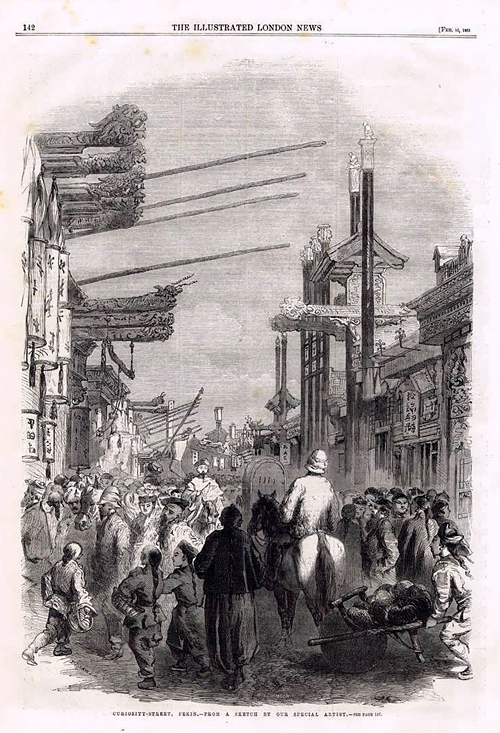|
|
||
|
|
||
|
|
|
|

Both the British and French called attention to the fact that local Chinese
also took advantage of the chaos at the Yuanmingyuan to help themselves to works
of art and other precious items. Many of these looted goods showed up in the
antique shops at Liulichang, which the British called “Curiosity Street.”
The burning of the palace two weeks later was accompanied by mixed feelings of
triumph, awe, and revulsion. Captain Charles Gordon—later to be famous as the leader of the Ever-Victorious Army against the Taiping
rebels and still later as “Gordon of Khartoum”—wrote home to his mother and sister that after receiving orders to burn the
palace:
We accordingly went out, and after pillaging it, burned the whole place,
destroying in a Vandal-like manner most valuable property, which would not be
replaced for four millions... You can scarcely imagine the beauty and
magnificence of the places we burnt. It made one’s heart sore to burn them; in fact these palaces were so large, and we were so
pressed for time, that we could not plunder them carefully. Quantities of gold
ornaments were burnt, considered as brass. It was wretchedly demoralizing work
for an army. Everybody was wild for plunder.
[6]
As soon as these events occurred, conflicting accusations flew: the British saw
the French as the initiators of the looting, while the French pointed out that
they had not participated in the burning of the palaces. The British had
devised their own method for dealing with the spoils of war: they allowed
soldiers to do some looting, but required them to turn over the goods to a
common pool for later auction. The proceeds were then divided among soldiers
and officers according to rank. Thus much of the loot reached a public market;
items were not necessarily taken home by the individual who had seized them.
Valuable objects from the imperial collections ended up in museums in England
and France. Others were offered for sale at fashionable auction houses in London and
Paris. Still other items were retained in family collections in private homes
all over Europe, but particularly in England.
Victor Hugo’s Letter of Protest
Both the British and French illustrated press published engravings depicting
this vandalism, and the great French writer Victor Hugo expressed his shame
over his country’s actions in scathing words that carry a ring of prophesy to the present day:
One day two bandits entered the Summer Palace. One plundered, the other
burned...Before history, one of the two bandits will be called France; the
other will be called England. But I protest, and I thank you for giving me the
opportunity! the crimes of those who lead are not the fault of those who are
led; Governments are sometimes bandits, peoples never.
Writing to his friend Captain Butler, he wrote emotionally and scathingly of the
wanton destruction of the Summer Palace, which he considered to be “a wonder of the world,” comparing it to the Parthenon in Greece, the pyramids in Egypt, the Coliseum in
Rome, and Notre-Dame in Paris. He said it was a work of the people.
If people did not see it they imagined it. It was a kind of tremendous unknown
masterpiece, glimpsed from the distance in a kind of twilight, like a
silhouette of the civilization of Asia on the horizon of the civilization of
Europe.
He compared Elgin’s destruction of the Summer Palace to the theft of marbles from the Parthenon.
Then, in a voice heard echoed a century and half later, he opined:
The French empire has pocketed half of this victory, and today with a kind of
proprietorial naivety, it displays the splendid bric-a-brac of the Summer
Palace. I hope that a day will come when France, delivered and cleansed, will
return this booty to despoiled China.
“Curiosity-Street, Pekin,” an illustration in the Illustrated London News, Feb. 16, 1861, shows the market where looted goods were likely to be traded.
[ymy7111] Wikimedia Commons
